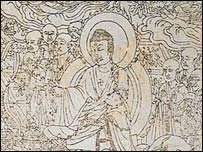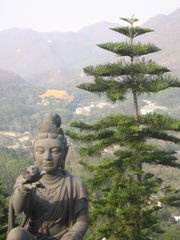 The Diamond Sutra was the second sutra I studied. It in conjunction with the Heart Sutra sums up the essence of Zen Buddhism. This sutra contains the Bodhisattva Vow, the concepts of emptiness as well as directives on mindfulness and constant meditation and practice. Here is part of the introduction from a translation that I really like...... LINK
The Diamond Sutra was the second sutra I studied. It in conjunction with the Heart Sutra sums up the essence of Zen Buddhism. This sutra contains the Bodhisattva Vow, the concepts of emptiness as well as directives on mindfulness and constant meditation and practice. Here is part of the introduction from a translation that I really like...... LINKIntroduction
The Diamond Sūtra (Vajracchedika-prajñāpāramitā-sūtraspan>) has maintained a high degree of popularity in the Mahāyāna Buddhist tradition for over a millenium, especially in East Asia, and most importantly within the East Asian meditation (Chan/Seon/Zen/Thien) school, where it has been recited, taught, and commented on extensively up to the present day. One reason for its popularity is its brevity — it can be chanted in about forty minutes, which means that it is something that an average person can memorize without superhuman effort. More important, though, is the basic resonance of the text's message with a core aspect of Chan doctrine/practice — the theme of "non-abiding." Non-abiding, in a Buddhist, and especially a Chan context, refers to the continual practice (i.e., not just while one is sitting in zazen) of being aware of the stoppings and goings of the mind, and avoiding being tricked and ensnared by the web of mental constructs that one continually weaves for oneself. The ongoing proliferation of these deluded constructs has as its causes and conditions not only in the thought processes in which one is engaged at the present moment, but also the flowing river one's entire multi-lifetime load of previous karma. And not only one's own karma, but the linguistic/karmic flow of one's entire culture.
A vitally important message of the Diamond Sūtra is that non-abiding should not be misconstrued as a nihilistic sort of practice. On the other hand, it also does not imply simply giving free reign to one's thoughts, since then, one is certainly going to get further wrapped up in the dense web of one's own spinning. Non-abiding necessitates the kind of moment-to-moment attentiveness that is awesome in its required subtlety. Nonetheless, with just a modicum of experience in meditative practice, the new student of the Diamond Sutra will no doubt begin to get some sort of feel for what is going on in this text. In a sense, it is simple: the thoughts, labels, signs, characteristics, etc., that we associate with given things, are nothing more than labels, and should not be imputed as the reality of the thing in itself, thus becoming reified objects of our desire and dislike. Yet there is also such a thing as thinking and seeing correctly, and it is permissible, nay, necessary, to use these notions, signs, and labels to function in daily life, and especially to study Buddhism for the aim of attaining enlightenment. Thus, Buddhism (and any other responsible contemplative tradition) cannot condone any attitude that recommends negating, or running away from any of the experiences that impinge upon our consciousness. Nor can it maintain that there is any such thing as a fixed, or final truth. As the Daodejingan> says, "The Way that can be taught is not the true Way." Either of these extreme options are none other than another form of abiding, or appropriation.
Source http://www.hm.tyg.jp/~acmuller/bud-canon/diamond_sutra.html




 Everything is impermanent, everything is selfless, and to experience this selflessness or emptiness is the experience the quiescence of Nirvana, Buddha nature and enlightenment.
Everything is impermanent, everything is selfless, and to experience this selflessness or emptiness is the experience the quiescence of Nirvana, Buddha nature and enlightenment.  Conversion is a highly charged political issue. Several states have passed laws this year making it harder to convert, and the mass ceremonies will infuriate Hindu nationalist parties that have been campaigning to stop lower caste Hindus changing their religion.
Conversion is a highly charged political issue. Several states have passed laws this year making it harder to convert, and the mass ceremonies will infuriate Hindu nationalist parties that have been campaigning to stop lower caste Hindus changing their religion.










